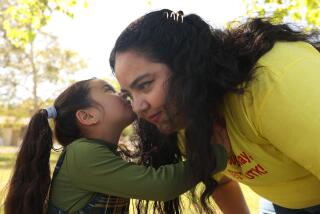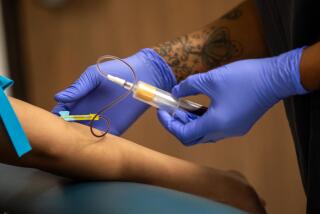U.S. Expands Drug Tests on Children With AIDS
- Share via
The federal government launched a $64-million effort Thursday to expand clinical trials of anti-AIDS drugs in children, marking the first systematic attempt to address the needs of the 1,188 children in the United States known to have the fatal disease.
The 5-year program will be based at 13 pediatric AIDS drug-testing centers in major U.S. cities, including Los Angeles, San Francisco and San Diego. The government will allocate $8.8 million the first year. Two of the centers already exist, and the rest will be started with the federal money.
Drug trials are being conducted on approximately 5,000 adults through a similar network of federal centers.
The new program will for the first time give children broad access to AZT, the only AIDS drug proven to be effective at prolonging life. Although research, not treatment, is the main goal of the program, researchers will also seek treatments for manifestations of the disease that are unique to children with acquired immune deficiency syndrome, such as acute bacterial infections.
‘Large Fraction’
“I hope we capture as large a fraction of the total population (of children with AIDS) as possible,” said Dr. Daniel Hoth, director of the AIDS program for the National Institute of Allergy and Infectious Diseases, which announced the new program at a Washington briefing.
In addition to the 1,188 children reported to have AIDS as of Oct. 3, there are an estimated two to three times as many children who are infected with the human immunodeficiency virus that causes AIDS but who do not show symptoms yet, federal officials estimate.
The slow progress of research and limited availability of drug treatments to children has concerned pediatric AIDS specialists in recent years, and they hailed the new effort as a step forward.
“A great deal of the hesitancy stemmed early on from just the need for pediatricians to convince (public health officials) that there was such a thing as pediatric AIDS,” said Dr. Stephen Spector, director of the new clinical trials unit for children at UC San Diego Medical Center. “It was several years after AIDS was identified and accepted in adults that pediatric AIDS was accepted, even though cases were identified at almost the same time as in adults.”
The U.S. Centers for Disease Control recorded the first case of a child with AIDS in late 1982 in San Francisco, a year after the first adult AIDS case was identified. By January, 1983, 26 childhood cases had been reported, and 10 of the children had died.
Dr. Yvonne Bryson of UCLA, co-principal investigator for the Los Angeles trials, said the network of pediatric AIDS centers will give children access to new AIDS drugs, as well as to AZT.
“We’re immediately starting any new drug (that becomes available) in children right away. And that’s a big change,” she said.
In addition, Bryson said the UCLA program and the University of Miami hope to begin a small trial within the next two months to see if AZT given to infected pregnant women just before birth will prevent transmission of HIV to the baby.
Infection before or during the birth process has become a particular problem in cities where women face a greater chance of contracting the virus through intravenous drug use or through being the sexual partner of a drug user. It has been estimated that 5% of births in the Bronx, for instance, are to women who carry the AIDS virus.
Other projects being planned nationwide include testing whether the antibodies in human immunoglobulin, given intravenously, can prevent some of the serious bacterial infections that afflict children who have AIDS; whether AZT given to babies shortly after birth can prevent infection from their mothers, and searching for ways to identify HIV infection in fetuses and infants.
Testing Centers
In addition to UCLA and UC San Diego, the centers designated Thursday will be located at UC San Francisco, at three hospitals in New York City and in Baltimore, Boston, Miami, Houston and Chicago. The two previously established pediatric AIDS testing centers are in Boston and Newark, N.J.
Los Angeles-area institutions cooperating in the UCLA effort are Childrens Hospital, Olive View Hospital, Cedars-Sinai Medical Center, Martin Luther King Jr./Drew Medical Center, Harbor-UCLA Medical Center, Long Beach Memorial Hospital, Kaiser Permanente and USC hospitals.
Also Thursday, the federal government announced its choice of seven other institutions that will serve as federal focal points for a program to find new treatments and a vaccine for AIDS. The effort will spend $30 million for the next five years.
These “centers of excellence” included three in Northern California: Stanford University, UC San Francisco and UC Davis. Others are Purdue University, the University of Washington, the University of Alabama and the Albert Einstein College of Medicine in New York.
More to Read
Sign up for Essential California
The most important California stories and recommendations in your inbox every morning.
You may occasionally receive promotional content from the Los Angeles Times.













